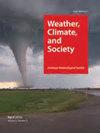Extreme Arctic Weather and Community Impacts in Nunavut: A Case Study of One Winter’s Storms and Lessons for Local Climate Change Preparedness
IF 1.9
4区 地球科学
Q3 ENVIRONMENTAL STUDIES
引用次数: 0
Abstract
Abstract Arctic communities are experienced with severe weather, but impacts can still be serious, particularly when the intensity or persistence of hazardous conditions is extreme. Such was the case for the community of Clyde River (Kangiqtugaapik), Nunavut, Canada, which experienced 33 blizzard days during winter 2021/22—likely the most at Clyde River since at least 1978/79. Blizzard conditions resulted from unusually frequent high winds rather than excessive snowfall. The most severe stretch included eight blizzard days over an 11-day period, with top wind gusts of 98 km h −1 . Winds caused severe drifting, covering homes and blocking streets. Broken heavy equipment, including snow-clearing machines, compounded the impacts, leaving homes without essential services like water delivery and sewage pump-out for days. Residents reported the storms and resulting impacts as some of the worst in memory. The drifting and volume of snow, combined with the lack of available resources to manage it, obliged the community to declare a state of emergency. Projections of increased Arctic precipitation and extreme weather events points to the need for communities to have proper resources and supports, including preparedness and adaptation and mitigation strategies, so they can be better equipped to handle storm and blizzard impacts such as those experienced at Clyde River in the winter of 2021/22. Additional steps that can be implemented to better support and prepare communities include investing in preparedness planning, expanded and enhanced weather information and services, community land-based programming to transfer Inuit knowledge and skills, assessing the usefulness of current forecasts, and new approaches to community planning. Significance Statement In this study, we consider the winter of 2021/22, during which the community of Clyde River (Kangiqtugaapik), Nunavut experienced 33 days with blizzard conditions—more than any other year since at least 1978/79. Blizzards are characterized by strong winds and blowing snow. Low visibility impedes travel, and drifting snow blocks roads and can bury equipment and buildings. In this case, broken snow-clearing equipment and other infrastructure challenges also hampered the community’s ability to respond, and residents went days without essential services. Several studies suggest that extreme winds will become more common in the Baffin Bay region in the future. This study demonstrates the need for proper resourcing of communities for preparedness, response, and adaptation strategies, especially with the possibility of extreme winter weather becoming more common.北极极端天气和对努纳武特地区社区的影响:一个冬季风暴的案例研究和对当地气候变化防范的教训
北极社区经历了恶劣天气,但影响仍然可能是严重的,特别是当危险条件的强度或持续时间是极端的。这就是加拿大努纳维特的克莱德河(Kangiqtugaapik)社区的情况,该社区在2021/22冬季经历了33天的暴风雪,可能是克莱德河至少自1978/79年以来最多的一次。暴雪是由异常频繁的大风造成的,而不是过多的降雪。最严重的一段时间包括11天的8天暴雪,最高风速为98公里每小时。大风造成严重的漂流,房屋被覆盖,街道被堵塞。包括除雪机在内的重型设备的损坏加剧了影响,导致一些家庭连续数天没有供水和污水泵等基本服务。居民们报告说,这场风暴及其造成的影响是记忆中最严重的。积雪的漂移和数量,加上缺乏可用的管理资源,迫使社区宣布进入紧急状态。对北极降水和极端天气事件增加的预测表明,社区需要有适当的资源和支持,包括准备、适应和缓解战略,以便他们能够更好地应对风暴和暴风雪的影响,如2021/22年冬天克莱德河所经历的影响。为更好地支持和帮助社区做好准备,还可以采取其他措施,包括投资于准备规划、扩大和加强天气信息和服务、社区陆上规划以转移因纽特人的知识和技能、评估当前预报的有用性,以及社区规划的新方法。在本研究中,我们考虑了2021/22年的冬天,在此期间,Nunavut的克莱德河(Kangiqtugaapik)社区经历了33天的暴风雪条件,比至少自1978/79年以来的任何其他年份都多。暴风雪的特点是强风和吹雪。低能见度阻碍了旅行,飘雪阻塞了道路,掩埋了设备和建筑物。在这种情况下,破碎的除雪设备和其他基础设施的挑战也阻碍了社区的反应能力,居民们几天没有基本的服务。几项研究表明,未来极端风在巴芬湾地区将变得更加常见。这项研究表明,需要为社区提供适当的资源,用于准备、响应和适应战略,特别是在极端冬季天气可能变得越来越普遍的情况下。
本文章由计算机程序翻译,如有差异,请以英文原文为准。
求助全文
约1分钟内获得全文
求助全文
来源期刊

Weather Climate and Society
METEOROLOGY & ATMOSPHERIC SCIENCES-
CiteScore
3.40
自引率
13.60%
发文量
95
审稿时长
>12 weeks
期刊介绍:
Weather, Climate, and Society (WCAS) publishes research that encompasses economics, policy analysis, political science, history, and institutional, social, and behavioral scholarship relating to weather and climate, including climate change. Contributions must include original social science research, evidence-based analysis, and relevance to the interactions of weather and climate with society.
 求助内容:
求助内容: 应助结果提醒方式:
应助结果提醒方式:


